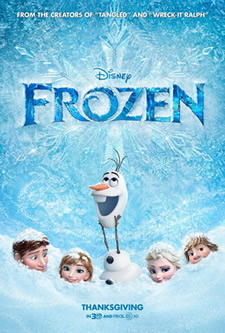The psychology of Frozen
 Union College psychologists George Bizer and Erika Wells make an appearance in a New Yorker post this week looking at how Frozen ended up being so popular. A clip from the piece by Maria Konnikova:
Union College psychologists George Bizer and Erika Wells make an appearance in a New Yorker post this week looking at how Frozen ended up being so popular. A clip from the piece by Maria Konnikova:
They organized an evening of "Frozen" fun--screening and movie-themed dinner--and called it "The Psychology of Frozen." There, they listened to the students' reactions and tried to gauge why they found the film so appealing.
While responses were predictably varied, one theme seemed to resonate: everyone could identify with Elsa. She wasn't your typical princess. She wasn't your typical Disney character. Born with magical powers that she couldn't quite control, she meant well but caused harm, both on a personal scale (hurting her sister, repeatedly) and a global one (cursing her kingdom, by mistake). She was flawed--actually flawed, in a way that resulted in real mistakes and real consequences. Everyone could interpret her in a unique way and find that the arc of her story applied directly to them. For some, it was about emotional repression; for others, about gender and identity; for others still, about broader social acceptance and depression. "The character identification is the driving force," says Wells, whose own research focusses on perception and the visual appeal of film. "It's why people tend to identify with that medium always--it allows them to be put in those roles and experiment through that." She recalls the sheer diversity of the students who joined the discussion: a mixture, split evenly between genders, of representatives of the L.G.B.T. community, artists, scientists. "Here they were, all so different, and they were talking about how it represents them, not ideally but realistically," she told me.
There's also some discussion about the always complicated business of princessification.
... said KGB about Drawing: What's something that brought you joy this year?